These days, young parents have tons of information about raising kids. There are books, websites, and experts offering advice on every little thing. They can even get consultations from specialists whenever they need. But our own parents didn’t have all that. They raised us based on what they knew and what they learned from their own parents. So sometimes, the way we were brought up can seem really different from what we’re told is best now.
1. Early marriage and parenthood go without saying.
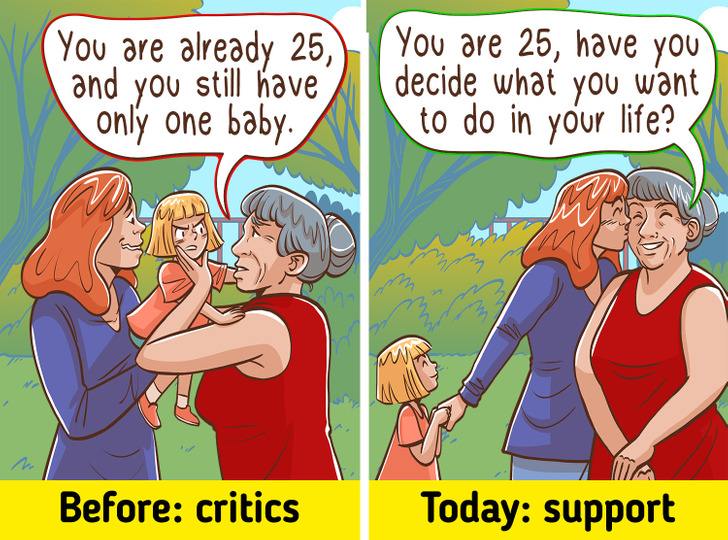
In earlier generations, there was often pressure on young adults to marry and start a family at a relatively young age, and to have more than one child a couple of years after the start of the family. Today, there is more emphasis on personal and career development before settling down. And moreover some researches show that early marriage can lead to some family problems, like dissatisfaction with married life, experience of having lots of responsibility, lack of independence in family life.
2. A college education is an indicator of your status.

«You can’t find a good job without going to college!» Many people must have heard this when they were teenagers. And lots of us believed this, but now don’t even know where our college diploma is. More than 41% of people that finished college have jobs that don’t require this kind of education. Today, employers are more interested in the practical skills of their employees rather than their qualifications.
When you finish school, it may be wise to take a gap year to understand what you really want to do and decide if you actually need a college education.
3. Classes are good for kids’ development — the more, the better!

A very tight schedule can exhaust children, which is obviously not good at all.
Famous American teacher Douglas Haddad recommends that parents slow down and give their children time to discover their own talents, and then decide if they need additional forms of education.
4. Being plump is healthy.
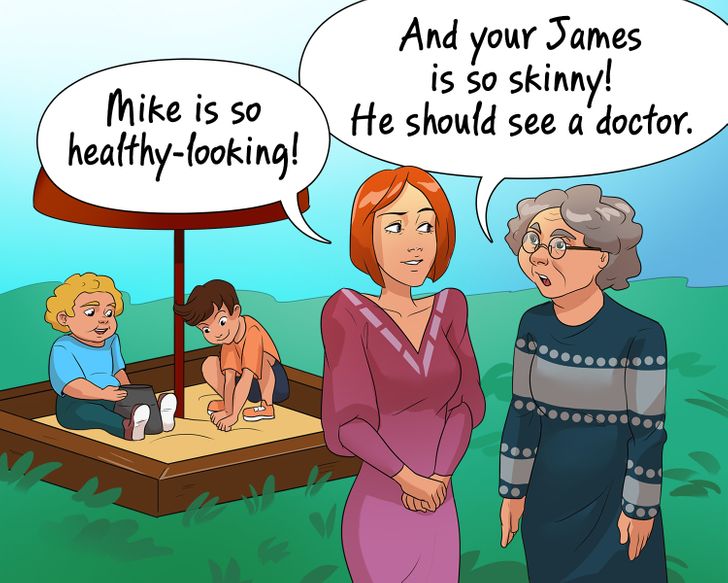
Children that always finished their meals were praised, and being plump was believed to be healthy. But bad eating habits formed in childhood often result in weight problems and eating disorders.
5. Money can’t buy happiness.

We wish this were true, but life says otherwise: money can make you happier, no matter what other people say.
Parents should teach their children the basics of budgeting. This will help kids form the right habits in money management and reach financial success in their adult lives.
6. Not standing out from the crowd means being good.
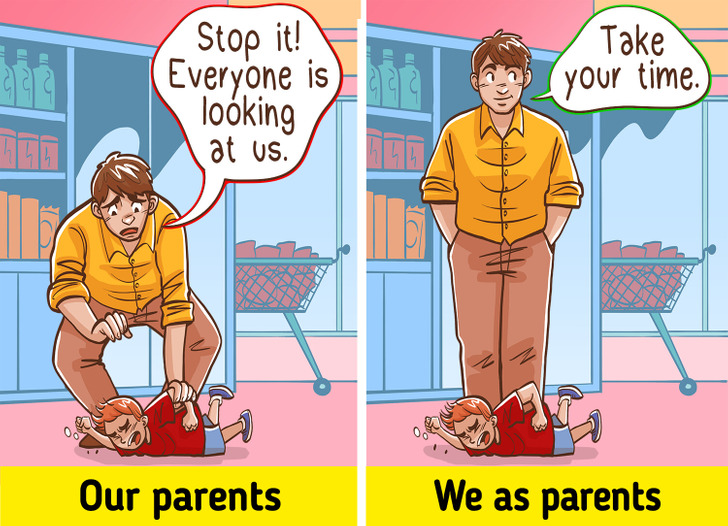
Traditional parenting often enforced strict dress codes and grooming expectations, particularly regarding modesty and conformity to societal norms. This might puzzle us today as modern parenting encourages children to express themselves through their clothing, appearance and let them express their emotions fully.
7. Older children are responsible for younger ones.
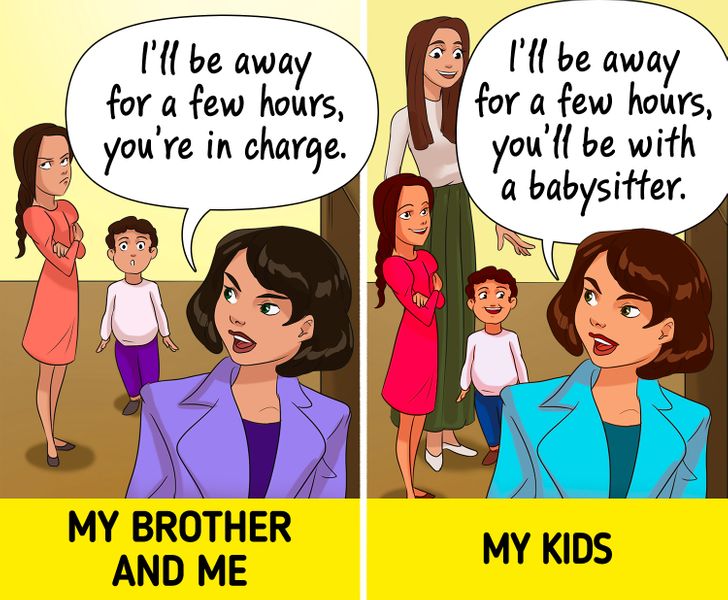
Very often, older children had to spend a lot of time taking care of younger ones. Parents had to work a lot and there was no other choice. But older kids had to sacrifice their time with friends and hobbies for the needs of their younger siblings.
Psychologists say that sometimes when kids have to perform the duties of parents, it may lead to psychological problems: they might not want to have their own children.
8. Women are housewives and men are breadwinners.

In recent decades, gender roles are not as important anymore. Women today can build successful careers and men can go on paternity leave and manage things around the house.
9. There’s nothing more shameful for a woman than having children without a husband.
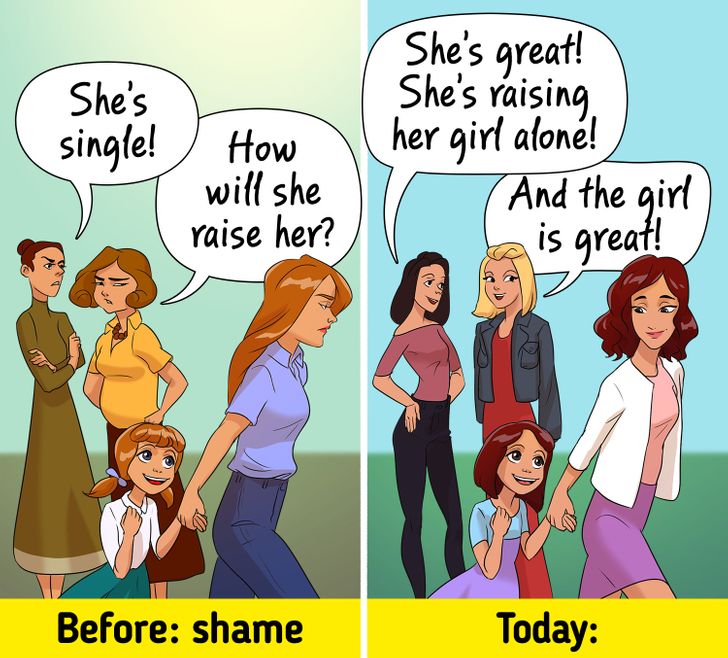
Wrong, again. Today, there’s nothing surprising about single mothers and they’re not frowned upon as they were 30 years ago. Very often, having a child without a husband is an informed decision made by a woman. More than that, in the past 30 years, the number of single fathers has increased 1.5 times.
10. Storks deliver babies.
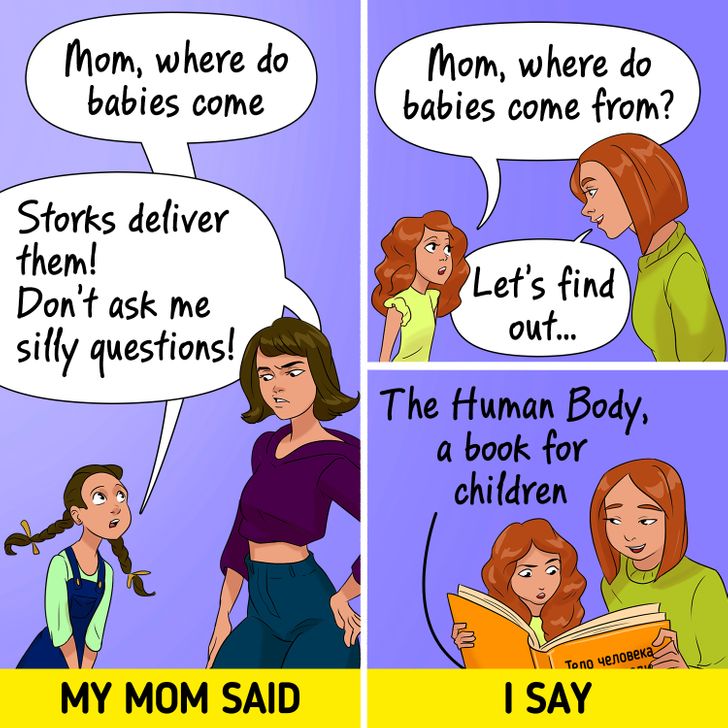
Some topics were never discussed — like when kids asked where babies came from, parents often said that they were delivered by a stork. Because of this, young people would often get into their first relationship without any knowledge of their bodies. They only based things off of the advice they received from their friends and bits of information from books and films. All these experiences could lead to bad consequences, including problems with both physical and mental health.
11. Children should be seen and not heard.

In the past, children were often expected to remain quiet and obedient in the presence of adults. Modern parenting emphasizes the importance of children expressing themselves and their opinions, because self-expression is a vital component of a young individual’s growth. The development of self-esteem and confidence in children is frequently nurtured by their capacity to express their feelings with clarity and authenticity.
Every parent has their own way of raising children. Just like how every family has its own special traditions, parents have rules they think are best for their kids. Sometimes, famous people, like celebrities, also share their ideas about parenting. They might talk about what works for them and their families. But in the end, each parent decides what’s right for their own children, based on love and what they believe is best.
Child star Mara Wilson, 37, left Hollywood after ‘Matilda’ as she was ‘not cute anymore’
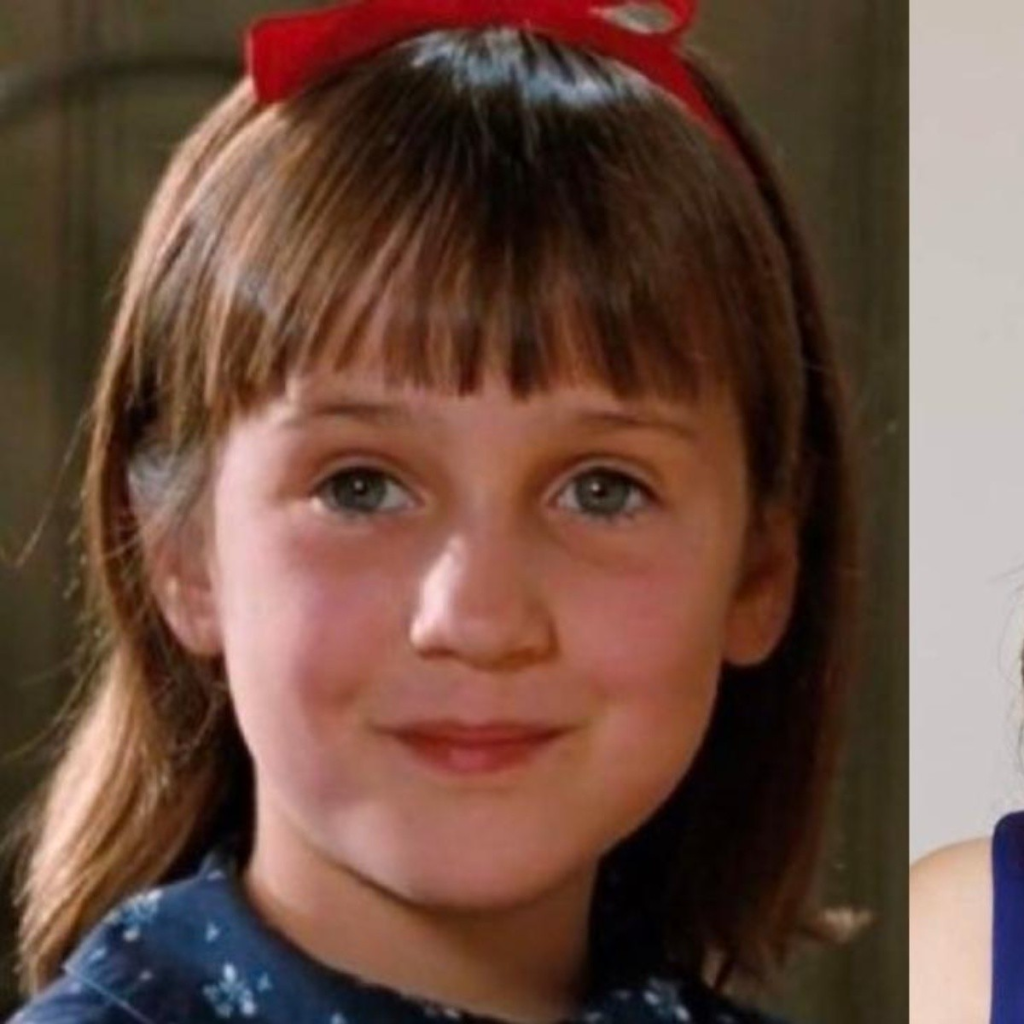
The world first fell in love with the endearing Mara Wilson in the early 1990s. She was a child actor best remembered for her roles as the bright young girl in beloved family films like Miracle on 34th Street and Mrs. Doubtfire.
The rising actress, who turned 37 on July 24, looked like she was ready for big things, but as she got older, she lost her “cute” factor and vanished from the big screen.
She continues, “If you’re not cute anymore, if you’re not beautiful, then you are worthless. Hollywood was burned out on me.”
To find out what happened to Wilson, continue reading!
When five-year-old Mara Wilson played Robin Williams’ youngest kid in Mrs. Doubtfire in 1993, she won over millions of fans’ hearts.
When the California native was invited to feature in one of the highest-grossing comedies in Hollywood history, she had already made appearances in advertisements.
“My parents grounded me even though they were proud of me.” My mother would always tell me that I’m just an actor if I ever stated something like, “I’m the greatest!” Wilson, who is now 37, remarked, “You’re just a kid.”
Following her big screen premiere, she was cast in 1994’s Miracle on 34th Street as Susan Walker, the same character Natalie Wood had performed in 1947.
Wilson describes her audition as follows: “I read my lines for the production team and told them I didn’t believe in Santa Claus” in an essay for the Guardian. “But I did believe in the tooth fairy and had named mine after Sally Field,” she writes, referring to the Oscar-winning performer who portrayed her mother in Mrs. Doubtfire.
“Very unhappy”
Next, Wilson starred with Danny DeVito and his real-life wife Rhea Perlman in the 1996 film Matilda as the magical girl.
Additionally, Suzie, her mother, lost her fight against breast cancer in that same year.
“I wasn’t really sure of my identity.I was two different people before and after that. Regarding her profound grief following her mother’s passing, Wilson explains, “She was like this omnipresent thing in my life.””I found it kind of overwhelming,” she continues. I mostly just wanted to be a typical child, especially in the wake of my mother’s passing.
The young girl claims that she was “the most unhappy” and that she was fatigued when she became “very famous.”
She reluctantly took on her final significant role in the 2000 fantasy adventure movie Thomas and the Magic Railroad at the age of 11. “The characters had too little age. I reacted viscerally to [the] writing at 11 years old.I thought, ugh. I love it, she says to the Guardian.
“Destroyed”
Her decision to leave Hollywood wasn’t the only one, though.
Wilson was going through puberty and growing out of the “cute” position as a young teenager, so the roles weren’t coming in for him.
“Just another weird, nerdy, loud girl with bad hair and teeth, whose bra strap was always showing,” was how she was described.
“When I was thirteen, no one had complimented me on my appearance or called me cute—at least not in a flattering way.”
Wilson had to cope with the demands of celebrity and the difficulties of becoming an adult in the public glare. It had a great influence on her, her shifting image.
“I had this Hollywood notion that you are worthless if you are not attractive or cute anymore. Because I connected that directly to my career’s downfall. Rejection still hurts, even if I was kind of burned out on it and Hollywood was burned out on me.
Mara in the role of author
Wilson wrote her first book, “Where Am I Now?,” before becoming a writer. “Ancidental Fame and True Tales of Childhood,” published in 2016.
The book explores “her journey from accidental fame to relative (but happy) obscurity, covering everything from what she learned about sex on the set of Melrose Place, to discovering in adolescence that she was no longer ‘cute’ enough for Hollywood.”
In addition, she penned the memoir “Good Girls Don’t,” which explores her experiences living up to expectations as a young performer.
In her Guardian column, she states, “Being cute just made me miserable.” It was always my expectation that I would give up acting, not the other way around.
How do you feel about Mara Wilson? Kindly share this story so that others can also comment and let us know what you think!

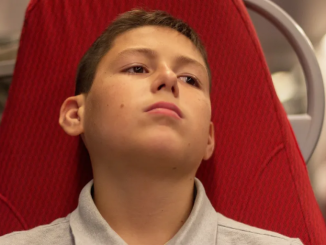
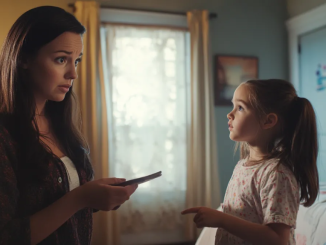
Leave a Reply